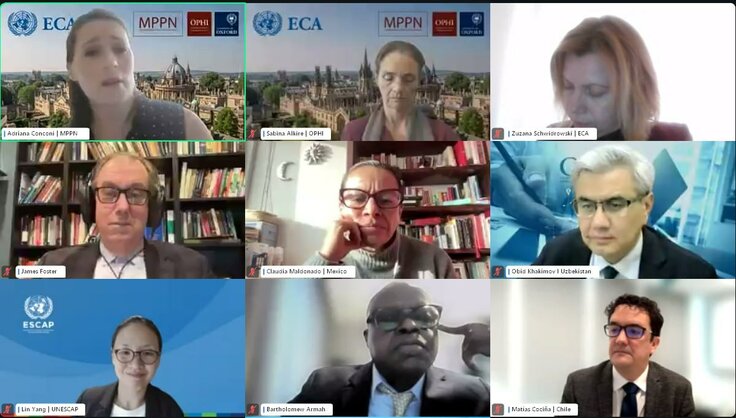Our Terms & Conditions | Our Privacy Policy
Uzbekistan’s Experience in Poverty Reduction Highly Praised at the 80th Session of the UN General Assembly
The event brought together leading scholars and representatives of the UN, the World Bank, international institutions, ministers and experts from around the world, including Sabina Alkire (OPHI), James Foster (George Washington University), Adriana Conconi (MPPN), and others.
During the session, international organizations and experts highly commended Uzbekistan’s experience in poverty reduction and wide-ranging reforms. It was emphasized that in recent years the country has achieved substantial progress: the poverty rate has decreased nearly threefold, 7.5 million people have moved out of poverty, and a national methodology for multidimensional poverty measurement has been introduced.
Obid Khakimov, Director of the Center for Economic Research and Reforms (CERR) and Deputy Adviser to the President of Uzbekistan, presented Uzbekistan’s results in addressing both monetary and multidimensional poverty. He noted that the development of human capital through targeted social programs and comprehensive reforms has become a key national policy priority.
As highlighted by the President of Uzbekistan, “improving infrastructure and creating favorable living conditions in the regions have been important steps in reducing multidimensional poverty.”
In this regard, active work is underway to improve infrastructure in disadvantaged regions where more than 3.5 million people live. In the current year alone, household plots of 470,000 families were provided with water supply, while 790,000 households saw improvements in energy provision.
Next year, an additional $400 million is planned to be allocated for infrastructure development, job creation, and entrepreneurship support. Projects worth $1.3 billion will be implemented to build drinking water supply networks, sewerage systems, roads, schools, and kindergartens. Annual mortgage subsidies will also be provided to low-income families.
Alongside Uzbekistan, representatives of Rwanda, Costa Rica, Mexico, Chile, Guatemala, Indonesia, and other countries shared their practical and research findings. Experts emphasized the importance of expanding access to education and healthcare, protecting women’s rights, introducing digital technologies, and developing social infrastructure.
On behalf of the African Union (AUDA-NEPAD), Bartholomew Armah stressed that over 500 million Africans live in multidimensional poverty, but there are positive examples such as India, Ethiopia, and Ghana. Key instruments highlighted include targeted investments in basic services, a comprehensive approach, and integration of MPI into national budgets.
Bjorg Sandkjaer, UN Under-Secretary-General for Economic and Social Affairs (UNDESA), noted that MPI allows identification of hidden vulnerabilities, particularly among children and people in conflict zones. She emphasized the importance of the “Beyond GDP” initiative and preparations for the Second World Summit on Social Development in Qatar.
Lin Yang, Deputy Executive Secretary of ESCAP, pointed out that while the Asia-Pacific region has advanced in poverty reduction, it remains off track for achieving SDG-1. ESCAP is developing digital platforms to identify vulnerable groups and is preparing a regional “Social Outlook” report for 2026.
Claudia Valenzuela, Vice Minister of Social Policy of Guatemala, presented alarming data: according to MPI-2024, more than half of the population (57.7%) lives in poverty, particularly rural residents and the Maya population. A social registry of households has been created for program targeting, and the “Mano a Mano” strategy is aimed at addressing specific deprivations through inter-agency coordination.
Claudia Maldonado, Coordinator of Mexico’s National Institute of Statistics and Geography, reminded that Mexico was the first country in the world to adopt an official multidimensional poverty index. Between 2016 and 2024 its rate declined from 43.2% to 29.6%, although challenges remain in healthcare access and 7 million people still live in extreme poverty.
Matias Cocina, Deputy Secretary of the Ministry of Social Development of Chile, reported that from 2009 to 2022 poverty by MPI fell by almost half, while over 80% of the poor by this index are not classified as income-poor. In Chile, MPI has become a tool of political dialogue and evaluation of social reforms. In 2023–2024, new indicators – employment, digital access, and safety – were added to the index.
Zuzana Brixiova Schwidrowski, Director of Gender, Poverty, and Social Policy at UNECA, concluded that Africa’s experience demonstrates poverty reduction is possible even in resource-limited countries, though conflicts and climate risks continue to exacerbate the situation. She emphasized the need for gender sensitivity and integration of the climate agenda into poverty reduction policies.
In summary, the event confirmed that combating multidimensional poverty requires the consolidation of international efforts, while sharing successful practices helps shape new approaches for achieving the Sustainable Development Goals.
CERR Public Relations Sector
Images are for reference only.Images and contents gathered automatic from google or 3rd party sources.All rights on the images and contents are with their legal original owners.



Comments are closed.